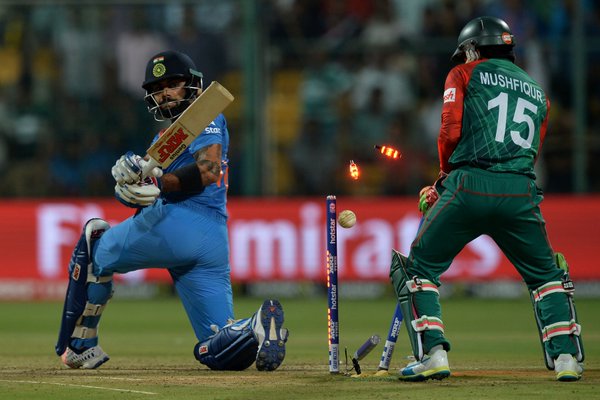All that is wrong with this World Cup!

It was the year when the T20 World Cup finally came to India. It was also meant to be the year when the Cup would finally come 'home' – India were “the pre-tournament favorites” according to one and all. The crowds were in, the sponsors were in – this edition was to be the biggest and best T20 Cup ever, and everything was falling in place. But that magnificent plot has been popping holes off the field everywhere since even before the first ball was bowled.
It all began before the tournament began. Caught in a political struggle between the two major parties of India, the picturesque Dharamsala was the hot bed of debate for a while. It did not help that the general secretary of one is also a top office-bearer of the BCCI. As Pakistan, in complete ignorance to people-in-glasshouses rule, also jumped into the fray, the ICC only looked on despondently. After much hand-wringing and dilly-dallying for a fortnight, it ended only when Kolkata was proposed as an alternate venue. Meanwhile, questions would arise as to why two venues, Dharamsala and Nagpur, received almost half of all the matches of the T20 WC – one is the hometown of the BCCI President, the other that of the secretary.
The tournament began on March 8 amid a clutch of onlookers who looked like they had wandered into a funeral uninvited as Zimbabwe took on Hong Kong at Nagpur. The farce was complete when the first ball was bowled – the short of a length ball took an eon to arrive at the other end of the pitch before it hit the bat and meekly came to rest a few feet down the pitch. This was the same dustbowl of a pitch that had been rated 'poor' by the ICC just months back after India had bundled out a strong Proteas side. In what can only be construed as a two-finger salute to the ICC, the BCCI then decided to hold the inaugural match at the exact same venue, and the ICC just went along with it. Ohh wait. Just checking to see if I interchanged their names somewhere there, not that it matters – the ICC appears to be just the BCCI read the other way round without the you-know-what.
The associates would have hoped this was finally the year when they would be allowed into the guarded halls of international cricket. But expecting the cricket body to inch towards the positive appears as futile an exercise as hoping for the ball to bounce beyond your hip on that Nagpur track. The associates remained the outcasts again. They came, they played, they left, they will get to play after may be four years. They do not get to play bilateral series at will, and these qualifiers are their only shot at a regular cricketing career. Most will just go back to their day-time jobs as bankers and teachers, while they struggle to make it large in this passion of theirs.
Associate cricket is more a battle for immediate survival than a battle for ultimate glory, but the ICC appears content to deny them even a decent shot at it. For a sport that needs to spread its wings about, the indifference of the system towards the associates appears inexplicable.
Equally inexplicable is the situation where Bangladesh found itself at the start of the Cup – slugging it through the qualifiers a week after coming runners-up in the Asia Cup. While a part of the blame needs to laid at the doorstep of the Bangladesh Cricket Board for not playing enough T20 cricket, the bigger fault lies in the system. When you consider it big enough to hold a World Cup every two years or every four years from hence, it is only expected that the interim should also see enough action on the front. But so far, T20s have been treated more like last-minute flings before you take the flight home. Unless there is a set schedule of tournaments that brings the associates to play alongside the Test cricket playing nations, the current state seems set to go on.
Bangladesh were struck by a bigger bolt just after they began their World Cup campaign when quickie Taskin Ahmed and spinner Arafat Sunny were banned for suspect action. While the decision is completely within the rulebook, what is unfortunate is the timing of the decision. Taskin made his debut in 2014 and has been playing for almost two years with no doubts cast by any official until that first qualifier match of the T20 WC. Bangladesh coach Chandika Hathurasingha was understandably furious when he heard about the decision. “They have bowled the same way as the last 12 months. As you said if they have officiated the matches they have been playing, they must have seen something different yesterday. That's all I can say," he said after the original report was filed. Being banned in a big point in any bowler's life, but when he is young, shoulders the hopes of a young cricketing nation, and is in the midst of a World Cup, a little more subtlety would not have hurt.
Amid all the fracas, however, the show goes on. The show goes on – despite the best efforts of the sport's administrators.

Comments
Sign up or log in to your account to leave comments and reactions
0 Comments